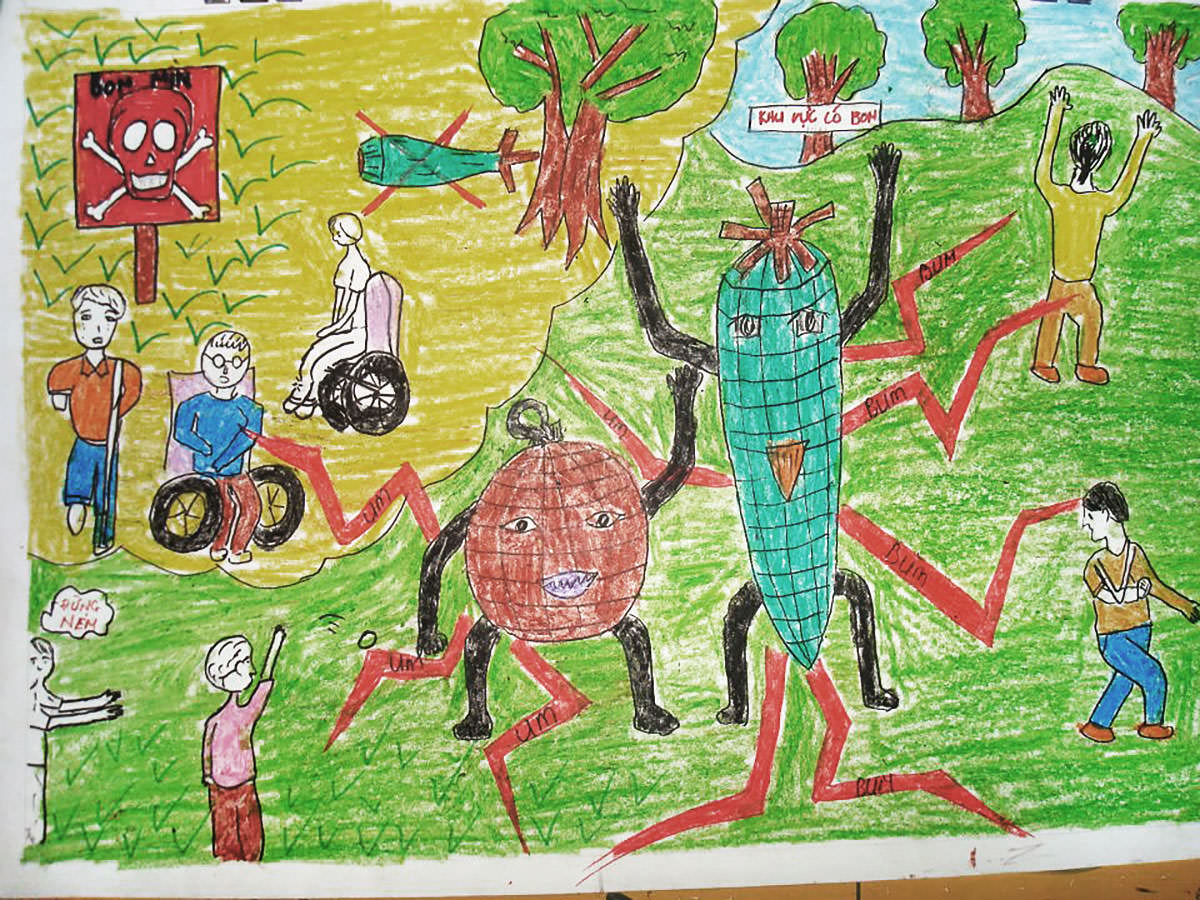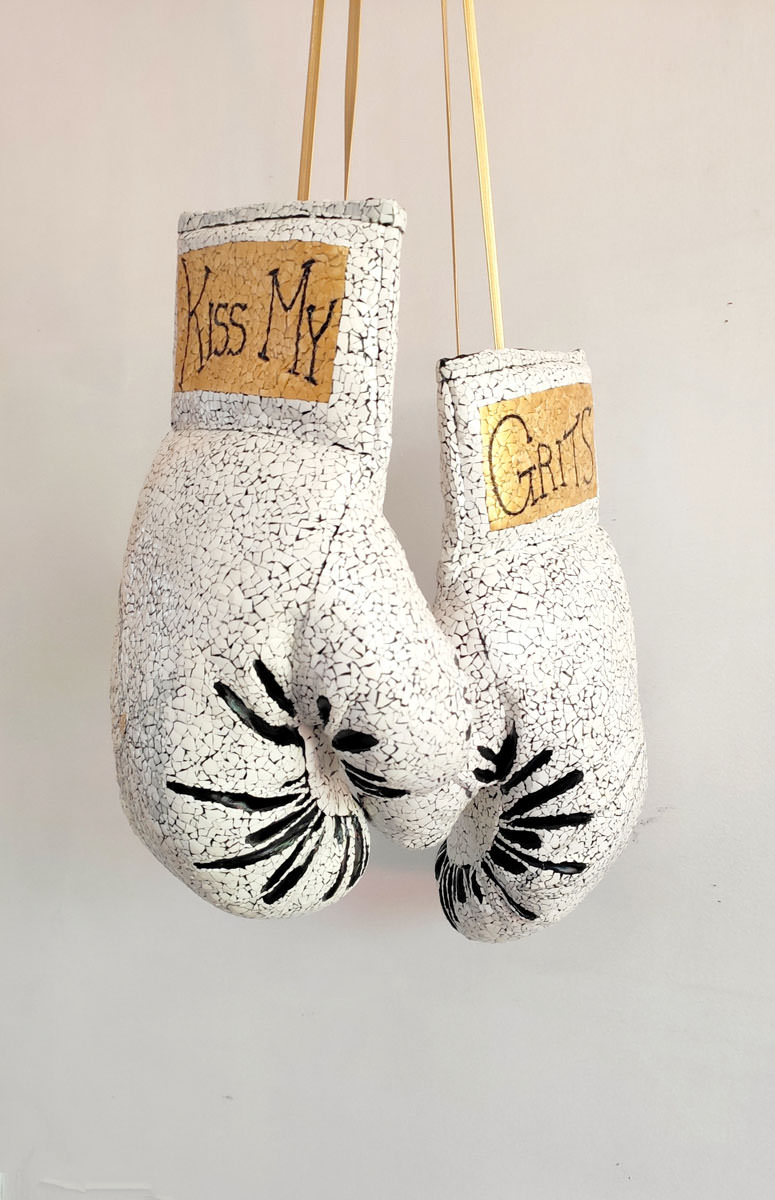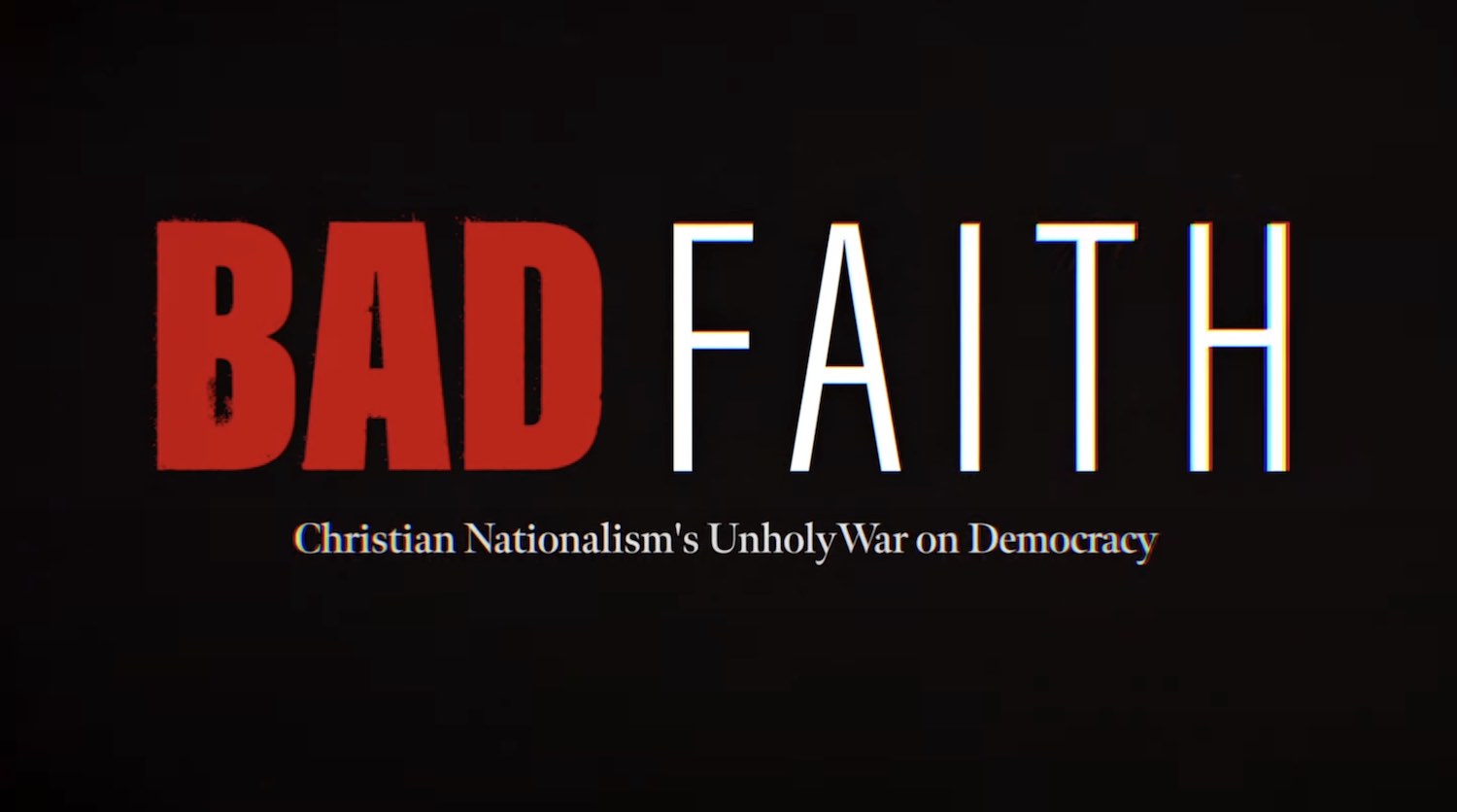Reflections on the 50th Anniversary of the End of the Việt Nam War

A Quảng Trị child’s painting, done at the Mine Action Visiting Center, warning about the dangers of mines and unexploded ordnance to children in that province
Introduction
The war that we called the Vietnam War and the Vietnamese on the other side called the American War (to distinguish it from the French War they had fought for 10 years and those against the invaders from the north they had fought for several thousand years) ended on April 30, 1975, on the occurrence that we and the Vietnamese who were our allies called the Fall of Sài Gòn, when soldiers of the People’s Army of Việt Nam took control of the capital city of what was then the Republic of Việt Nam, renamed it Thành phố Hồ Chí Minh, and reunited the country that had been divided as a result of the contingencies of the Cold War since 1954.
On the occasion of the fiftieth anniversary of that ending, The Washington Spectator explores the Việt Nam/American War, its aftermath, and its place and effects today on individuals, families, and American culture and political life. We are grateful beyond measure to Hamilton Fish for inviting us to serve as guest editors for this Special Issue, it has been a deeply meaningful experience for both of us. We also wish to acknowledge the dedication and professionalism of Kirsten Denker and Amber Hewitt, whose superb copy and digital editing are on display throughout these pages.
We have asked a variety of writers, scholars, activists, novelists, poets, and artists, Vietnamese and American, all of whom have been touched in some way by the war or its aftermath, to respond to two basic questions: What have we learned? and What have we not learned? In their responses each one reinforces in different ways the truth our first contributor, Andrew Lam, a Vietnamese American journalist and short story writer who came to America as a refugee, insists upon: that the personal and the historical are intrinsically bound.
Our readers will also find links to works and commentaries by artists from the diasporic Vietnamese American community in the American South, from the Ogden Museum of Southern Art’s exhibit Hoa Tay (Flower Hands).
Wayne Karlin and Randy Fertel
Table of Contents
A Personal War
The celebrated journalist and novelist recounts how he has wrestled with the cross-generational trauma of the war through his writing, and records the reactions his work has elicited from younger readers.
The author recalls being in Air Force basic training with his twin brother during the war, viscerally conveying the sense of what it felt like to be a young man at that time.
by Richard Bausch
The Vietnamese novelist and poet’s memories include a childhood spent amidst a landscape littered with bullet casings, the lingering effects of Agent Orange, and families and neighbors still waiting for soldiers to come home.
by Nguyễn Phan Quế Mai
The author learned to stay alive despite the incongruity between the deadly situation in which he found himself—and the fiction with which it was depicted by the government that put him there.
by Bruce Weigl
Morally against the war but motivated to understand both the war and the country in which it was taking place, Balaban writes about these explorations as well as his harrowing experience as a volunteer health worker.
by John Balaban
The poet George Evans, a medic in Viet Nam, speaks to the ways that his memories of the war have haunted him, and the circle of healing he found among fellow poets, writers, and boxing fans in San Francisco.
by George Evans
“I have always been interested in silences, what people say or can’t say, or should say and won’t say,” Mason describes imagining what was behind the wall of silence she felt from her veteran father, and from her own contemporaries during the Vietnam War.
by Bobbie Ann Mason
“In war, I begin to grasp, one bleeds out not quickly but through a slow, decaying erosion of faith and humanity.” A 17-year-old high school student in Hanoi, already a searingly perceptive writer, turns to the novel The Sorrow of War by Bao Ninh.
by Phạm Bùi Gia Khanh

Special Issue
Vol. 50, No. 1 ISSN 0887-428X
©2025 The Public Concern Foundation
Guest Editors
Wayne Karlin
Randy Fertel
Copy Editor
Kirsten Denker
Digital Editor
Amber Hewitt
Aftermaths
Hoa Tay (Flower Hands)
Artwork of Southern Artists of the Vietnamese Diaspora
Ogden Museum of Southern Art
New Orleans
March 15 -September 21, 2025
A leading chronicler of the post-Vietnam War landscape reflects on how DOGE and the Trump administration’s dismantling of USAID and the United States Institute of Peace have disrupted the long road toward reconciliation.
by George Black
Karlin discusses how veterans have helped form and participated in Vietnamese organizations working to clear unexploded ordnance, counter the effects of Agent Orange, and build schools and clinics.
by Wayne Karlin
Hammond, the daughter of a U.S. Vietnam veteran, the Founder and Executive Director of the War Legacies Project, describes that organization’s efforts to help mitigate the devastating long-term health and environmental impacts of Agent Orange.
by Susan Hammond
A senior staff member with Project RENEW in Quang Tri, Hiền writes movingly about his family history and provides short summaries of the efforts of his organization to clear unexploded ordnance and aid the victims.
by Ngô Xuân Hiền
Formed out of a reaction to being ostracized or ignored both by the public and existing veterans’ organizations, the movement today advocates for all veterans and cooperates in reconciliation programs with the veterans’ organizations of the former enemy in Viet Nam.
by Marc Leepson
What we can learn from the teenagers in Iowa who were expelled from their high school for resisting the war, the subsequent Supreme Court decision in their case, and the example in the heartland of providing refuge for victims of the war.
by Jeff Biggers
A Navy nurse during the Vietnam War whose father died in World War II, Schnall describes how she turned against the war, how America’s intervention in Vietnam segued to the intervention in Chile, and the need to fight against militarism and social injustice.
by Susan Schnall
A museum director, Dr. Black describes has given voice to the perspectives of African American soldiers who served in the Vietnam War, and portrayed the origins and backgrounds of the individuals whose stories were featured.
by Samuel W. Black
The arc of the courageous actions of Ron Ridenhour, who demanded accounting for the brutal attack on My Lai while still a soldier in Vietnam, that led eventually to the establishment of the Ridenhour Awards to honor whistleblowers and truth-telling.
by Randy Fertel
Directions
Ehrhart argues that by ending the draft, American foreign policy makers were able to deploy the volunteer-based armed force in subsequent foreign wars without fear of domestic consequences.
by W.D. Ehrhart
Growing up as an African American conscious of the effects of the war in Vietnam on his community, Miller observes how little the country seems to have learned as it continues to contemplate foreign interventions.
by E. Ethelbert Miller
A leading scholar on the prevention of war recounts his motivation to become an active protester while still a soldier in Vietnam, and recommends effective nonviolent strategies for present-day activists opposing the Trump regime.
by David Cortright
Johnson served time in a military prison after he and two other soldiers—one was white and and the other Latino—refused orders to go to Vietnam on moral grounds. He writes of his moral education and speaks to how these principles can inform positive political action in the current environment.
by JJ Johnson
An American Vietnam veteran living in Hanoi, Searcy plays a key role on behalf of many projects in Viet Nam, including Project RENEW. He writes about the need for America to act out of a sense of responsibility for the vast damage it caused to Viet Nam.
by Chuck Searcy


